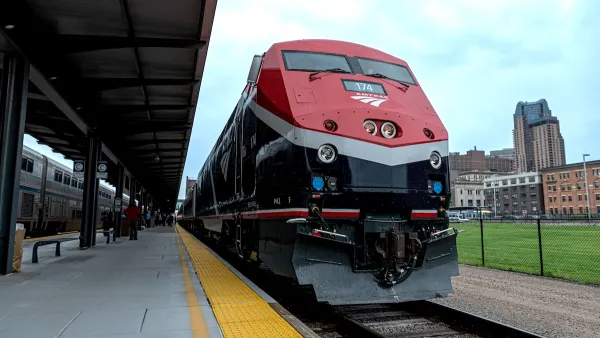After decades of decline, Chicago is reveling in its resurgence as America’s hottest urban center and a “port of the global age.” However, these successes conceal a city struggling with increasing inequality and a planning culture “in retreat.”

 In their new book, Planning Chicago, published in advance of this year’s APA National Conference, D. Bradford Hunt and Jon B. DeVries examine the plight of planning in the postwar city and issue a call to action to restore comprehensive long range planning to the Windy City. In an interview with managing editor Jonathan Nettler, the authors discuss Chicago’s peculiar planning history and the role that planning should play in the contemporary city.
In their new book, Planning Chicago, published in advance of this year’s APA National Conference, D. Bradford Hunt and Jon B. DeVries examine the plight of planning in the postwar city and issue a call to action to restore comprehensive long range planning to the Windy City. In an interview with managing editor Jonathan Nettler, the authors discuss Chicago’s peculiar planning history and the role that planning should play in the contemporary city.
The interview has been edited for clarity.
Planetizen: In a city with such an illustrious planning history, why focus on the postwar period?
Jon B. DeVries: The city completed a very appropriate and honorable celebration of the Burnham Plan to celebrate its centennial in 2009. But what happened in 1957 was that the city transitioned from using a planning commission, which was a descendant of the Burnham Plan, into setting up its first executive-level planning department. So, we pick up the dialogue at that point; where the modern era of planning in the city begins.
D. Bradford Hunt: A lot of books start with Burnham. But Burnham is not the beginning and end of planning in Chicago. A key transition took place in the period from 1957-1975, when the city did a lot of robust work that hasn't been well cataloged and examined. That era of what we call "modern planning" deserves to be discussed and reinvigorated.
Planetizen: Chicago’s noted renaissance over the past couple of decades, which has included some well received initiatives such as Millennium Park and Mayor Daley’s green roofs program have all happened while planning in Chicago has been “in retreat," as you say. What does that say about the role planning could or should play in the contemporary city?

Jon B. DeVries: Millennium Park was actually the completion of a much earlier vision from the Burnham Plan, so its lineage goes back fairly far. The green roof program is a fine effort, but it’s just one of the city’s middle range successes in planning. Chicago has retreated from taking a longer view and producing the more comprehensive plans of the 50s, 60s, and 70s that produced a lot of the significant changes you now find in downtown (such as the residential boom).
D. Bradford Hunt: Millennium Park is perceived as a great planning success. But if you actually look at its development, it essentially evolved as a deal led by Mayor Daley. It started being built as a parking garage, and portions had to be rebuilt when they decided that it would be topped with art. It was a chaotic implementation of the last piece of the Burnham Plan. But it's perceived as “finishing” Chicago.
The park’s development is emblematic of the challenge we identify in the book: that we're not planning for our future in the way that we need to. We don't have the guide for the next 30 years that we did when we laid out things in 1957. The comprehensive planning that began in that era provided the framework for a lot of the city that we see today.
Planetizen: At the heart of the book is a call to action to restore planning to Chicago. But you also describe the governance structure of the city (strong mayors and “parochial” alderman) as an impediment to comprehensive planning. Do you think that the governance structure needs to change in order for planning to be restored?
Jon B. DeVries: We don’t think we'll be persuasive enough to change the governance structure. But we do believe that well-funded, well-conceived plans could be a great benefit to the decision-making process by giving staff and alderman a foundation to make decisions based on a mutually agreed-upon longer-range view.
That's important in two ways. First, it resists the knee jerk NIMBY anti-growth sentiment that sometimes accompanies neighborhood efforts. Second, it’s an antidote to developers who want a free for all.
A plan gives them some solid standing to resist special interests. That’s one way, we hope, to reduce the need for basing decision on “aldermanic privilege.”
Planetizen: Your book ends prior to Mayor Rahm Emanuel's administration. But there have been some impressive and progressive initiatives led by the current administration oriented around reviving the riverfront, expanding bike infrastructure, implementing bus rapid transit, establishing an infrastructure bank, and so on. Do you see this as a change in the state of affairs that you describe in the book, or is it more of the same?

Jon B. DeVries: The efforts that the Mayor has undertaken are fine, but he could be doing even better if he had a strong planning department behind him. What's been proven time and time again in Chicago is that to really move the needle you need what the book calls a "growth coalition," combined with a strong planning department, a cooperative mayor, and public consensus. There are a couple of those pieces moving forward today (such as the revitalization of World Business Chicago), but certainly not all of the pieces that are needed to really move the needle.
D. Bradford Hunt: Mayor Emanuel is a very shrewd politician and he's looking for projects that will get him some short-term gains. Many of the initiatives you mention are not connected to a long-term plan (the riverfront being the one exception). For instance, the “opportunity planning areas” that he recently unveiled aren’t connected to the kind of comprehensive, community-based planning that you have to do, and that we used to do, in a stronger way in Chicago.
Planetizen: In the book, you indicate that one of the primary elements missing from the city's renaissance has been a more balanced distribution of growth. Is that a role that planning must play in the city?
D. Bradford Hunt: We agree on that. We're grateful that we’ve had this growth downtown; it's been great for the city on several fronts. We're not Detroit. We have a strong residential base downtown that has allowed the city to make investments elsewhere (like the spate of library construction). Without a tax base you can't do it.
We're finally developing through the Local Initiatives Support Corporation (LISC), and other models, effective ways to engage the community and do planning that has a chance to do something good in the city’s neighborhoods. Yet, we're not necessarily running with that in the way that we should.
We have now fractured our capital budgeting into a whole bunch of TIF money, and TIF is driving so much of the planning that the city is not distributing those resources as effectively as it could.
Planetizen: Finally, on behalf of the thousands of planners that will be descending on your city in mid-April, what do you think we can learn about planning in our own cities by coming to Chicago?
Jon B. DeVries: First, I think visitors will be impressed with the retail and the residential vitality downtown, and hopefully there will be some lessons learned that they could take back to their cities.
Secondly, we recognize that the problems with planning aren’t limited to Chicago. And we’ll be touching on this in our session at the conference. Throughout the country, there has been a public backlash in the name of private property rights against using eminent domain, and against systematic planning.
Frankly, a lot of cities have seen planning as one of those places where they can cut budgets. I hope one of the things we can do is send them back with a sense that short-term budget cuts will lead to some expensive decisions in the long-term. If we do that, we'll have done a lot.
D. Bradford Hunt: Cities need a vision for the future. Chicago looks finished, but there's a lot of work to do. We have to guide significant transit investment, recalibrate our industrial policy, and attract new populations to the city. And it will take long-term planning to achieve that.
So while we look better than everybody else in the Midwest in many ways, we still have a lot of challenges that require Planning’s engagement.
The APA Conference will be held from April 13-17, 2012 in Chicago. Please check back with Planetizen for our continuing coverage as the conference draws near.

Maui's Vacation Rental Debate Turns Ugly
Verbal attacks, misinformation campaigns and fistfights plague a high-stakes debate to convert thousands of vacation rentals into long-term housing.

Planetizen Federal Action Tracker
A weekly monitor of how Trump’s orders and actions are impacting planners and planning in America.

Chicago’s Ghost Rails
Just beneath the surface of the modern city lie the remnants of its expansive early 20th-century streetcar system.

Bend, Oregon Zoning Reforms Prioritize Small-Scale Housing
The city altered its zoning code to allow multi-family housing and eliminated parking mandates citywide.

Amtrak Cutting Jobs, Funding to High-Speed Rail
The agency plans to cut 10 percent of its workforce and has confirmed it will not fund new high-speed rail projects.

LA Denies Basic Services to Unhoused Residents
The city has repeatedly failed to respond to requests for trash pickup at encampment sites, and eliminated a program that provided mobile showers and toilets.
Urban Design for Planners 1: Software Tools
This six-course series explores essential urban design concepts using open source software and equips planners with the tools they need to participate fully in the urban design process.
Planning for Universal Design
Learn the tools for implementing Universal Design in planning regulations.
planning NEXT
Appalachian Highlands Housing Partners
Mpact (founded as Rail~Volution)
City of Camden Redevelopment Agency
City of Astoria
City of Portland
City of Laramie




























